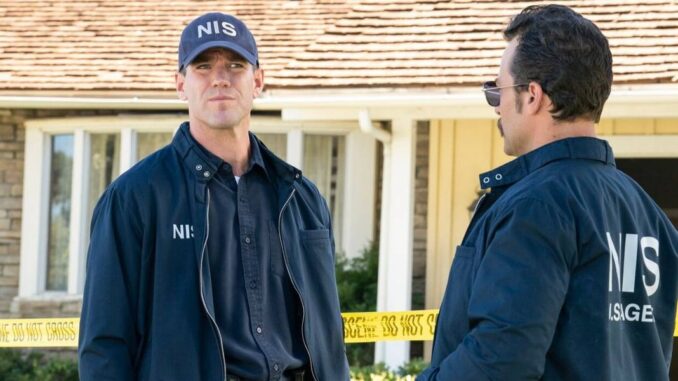
Introduction: Why Episode 1.17 Strikes a Chord
If you thought NCIS: Origins had already hit its emotional peak, think again. Episode 1.17, titled “Darlin’ Don’t Refrain,” delivers a gut punch wrapped in a heartfelt bow. It’s not just another case-of-the-week—this one hits close to home, unraveling layers of young Leroy Jethro Gibbs you didn’t know existed.
This review takes a deep dive into everything that made Episode 1.17 unforgettable—its emotional core, clever storytelling, and a hauntingly beautiful title that echoes long after the credits roll.
What’s in a Title? The Hidden Meaning Behind “Darlin’ Don’t Refrain”
Let’s start with that poetic title. “Darlin’ Don’t Refrain” isn’t just a catchy line—it’s a metaphor for the emotional walls Gibbs has built. The episode explores themes of love, regret, and restraint, all centered around the idea of holding back when you should speak your truth. Whether it’s love, justice, or personal demons, this episode urges its characters—and viewers—not to refrain.
Episode Recap: Plot Summary Without Spoilers
The story kicks off with a seemingly simple case involving a missing Navy musician. But as the team digs deeper, they discover ties to a cold case that hits Gibbs on a personal level. This case unlocks flashbacks, unresolved grief, and a confrontation with his own emotional repression. The plot is layered but clean, keeping viewers engaged from start to finish.
Gibbs’ Growth: The Emotional Core of the Episode
Gibbs is often portrayed as stoic, almost robotic. But here, we get a rare glimpse behind that stone face. In “Darlin’ Don’t Refrain,” Gibbs is forced to face memories he’s tried to bury—some connected to his mother, others to his early relationships. And let’s just say, Austin Stowell earns every second of screen time with his raw, understated performance.
New Faces and Familiar Names
This episode introduces a few new characters who could have major long-term implications:
-
Clara Wolfe, a jazz singer with ties to the case—and maybe to Gibbs’ past.
-
Lt. Bradley Ross, a character who might be the moral compass Gibbs learns from.
These additions are more than plot devices. They’re mirrors to Gibbs’ emotional state and catalysts for his inner evolution.
Director Franks: More Than a Mentor
Mike Franks once again proves why he’s not just a side character. His role in this episode is pivotal. When Gibbs begins to spiral emotionally, Franks is the anchor that keeps him grounded. Their banter is still sharp, but there’s a father-son undertone that adds weight to every scene they share.
The Flashbacks: Heartbreaking and Necessary
This episode doesn’t just rely on current drama—it dips into flashbacks of Gibbs’ teenage years, showing a moment with his mother that clearly shaped his emotional distance. These scenes aren’t filler—they build context that fans have been craving for years. They’re raw, unpolished, and they hurt in the best way possible.
The Case: Simple Setup, Complex Payoff
You might think a musician going missing wouldn’t be all that captivating, but the writers flip the script. What starts as a missing persons report turns into a decades-old cover-up that questions institutional loyalty and personal integrity. And the twist? You won’t see it coming.

Dialogue That Cuts Deep
Lines like “Sometimes, saying nothing is the biggest lie of all” give this episode the emotional gravitas it needed. The writing feels personal—like it came from someone who’s lived these regrets. Every character gets a moment to shine, but it’s Gibbs’ quietly devastating monologue that seals the deal.
Soundtrack and Atmosphere: A Perfect Match
Jazz plays a subtle but crucial role in the background. It’s moody, nostalgic, and symbolic. When Clara Wolfe sings “Darlin’ Don’t Refrain” in the closing minutes, it’s not just haunting—it’s cathartic. The music underscores the theme of emotional honesty without beating you over the head.
Direction and Cinematography: Subtle Brilliance
Episode 1.17 might not have the explosive set pieces of earlier episodes, but what it lacks in action, it makes up for in intimate cinematography. Close-up shots, dim lighting, and minimal background noise all put the spotlight squarely on character emotion. It’s a quieter episode—but one that screams volumes.
Symbolism: More Than Just Drama
Keep an eye on visual metaphors—particularly a broken record that plays throughout the episode. It’s an on-the-nose but effective symbol for Gibbs’ emotional loops. He’s stuck, rewinding the same pain over and over, too afraid to hit stop or play a new tune. That record? It’s his soul on vinyl.
Themes That Hit Hard
-
Regret and Restraint
-
Grief in Silence
-
Mentorship and Found Family
-
The Power of Music as Memory
Each of these threads weaves beautifully into the episode’s fabric, making it more than just your average procedural plot.
Performance Highlights: Austin Stowell Deserves Applause
Austin Stowell as young Gibbs continues to prove he was the perfect casting choice. His nuanced performance this week—especially in scenes of quiet grief and inner conflict—cements him as not just a placeholder for Mark Harmon, but an actor carving his own version of Gibbs that still honors the original.
Audience Reactions: Why Fans Are Buzzing
Fans flooded social media after this episode aired. Tweets and posts echoed the same sentiment: “That ending wrecked me.” It’s rare that a procedural drama triggers such strong emotional responses, but Darlin’ Don’t Refrain proved that NCIS: Origins has heart—and isn’t afraid to show it.
Final Verdict: A Standout Episode
Episode 1.17 is easily one of the best NCIS: Origins installments yet. It balances character development, emotional storytelling, and plot momentum with the precision of a jazz solo. It might not be the flashiest episode, but it leaves the biggest impression.
Conclusion: Why “Darlin’ Don’t Refrain” May Be the Show’s Emotional High Point
NCIS: Origins has slowly peeled back the layers of Leroy Jethro Gibbs, and Episode 1.17 feels like a breakthrough moment. It’s a soulful, haunting, and deeply personal installment that explores what it means to hold back versus letting go. This is the kind of storytelling that transforms a procedural into a prestige drama.
FAQs
1. Why is the episode called “Darlin’ Don’t Refrain”?
The title reflects the emotional theme of the episode—urging characters not to hold back their truths, emotions, or regrets. It’s also the name of a pivotal song featured in the episode.
2. Is Clara Wolfe a new recurring character in NCIS: Origins?
While Clara plays a crucial role in Episode 1.17, it’s unclear if she’ll return. However, her chemistry with Gibbs opens the door for future appearances.
3. What does this episode reveal about Gibbs’ past?
This episode dives into Gibbs’ early emotional trauma, particularly involving his mother. It helps explain why adult Gibbs is so emotionally reserved.
4. Does Episode 1.17 tie into the original NCIS series?
Yes. There are subtle nods and emotional echoes that align with the Gibbs we know from NCIS, making it a satisfying watch for longtime fans.
5. Where can I watch NCIS: Origins Episode 1.17?
You can stream the episode on Paramount+ or catch reruns on CBS. Make sure to have tissues handy—you’ll need them.